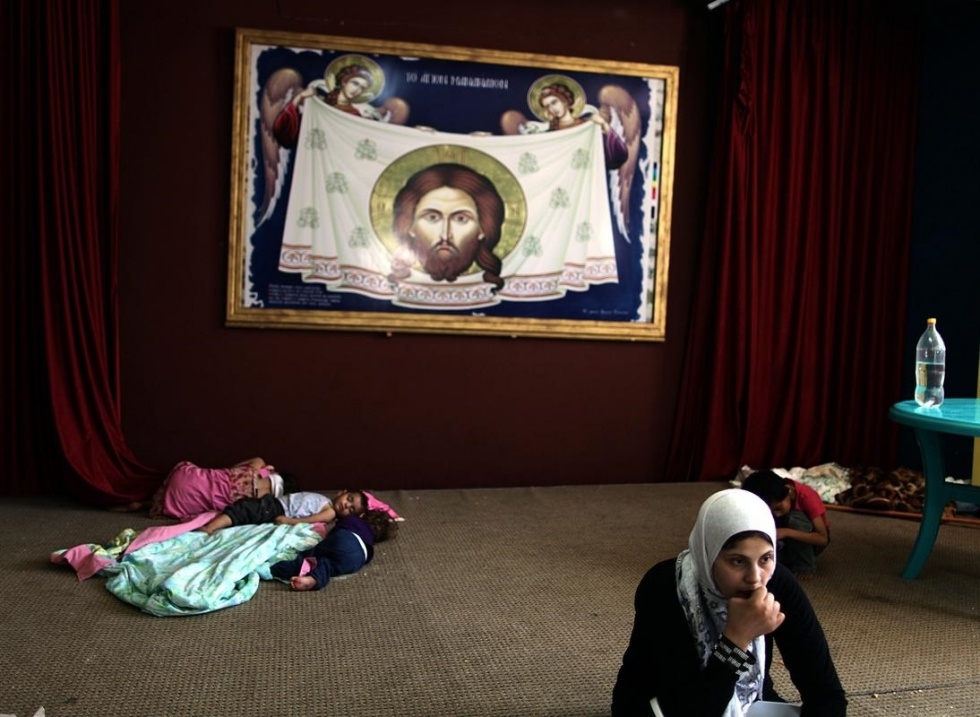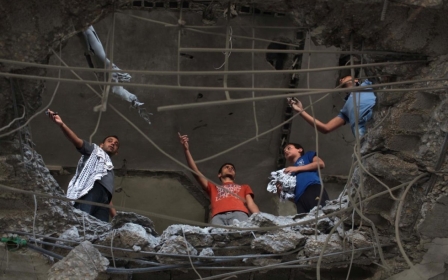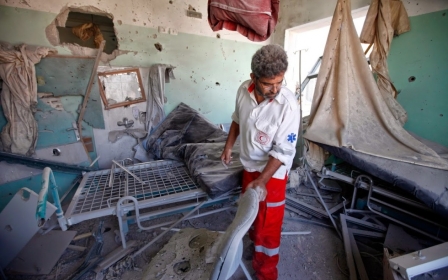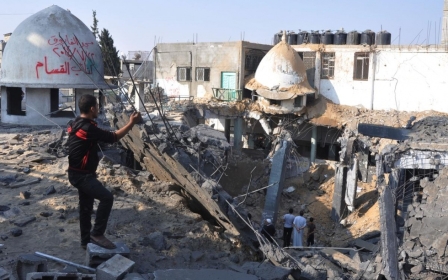Hundreds of families seek refuge in Gaza's Churches

GAZA CITY - Umm Abdullah Hijazi, holds her 1 year-old son, Yousef, as she pours water on a bar of soap and tries to wash the boy and his clothes.
But although she scrubs hard, the soapy mixture proves inadequate, and Hijazi cannot wash away the dirt and blood-stains that spattered the boy’s body as his family fled their home under the hailing of Israeli bombs.
“We ran outside as fires broke out all around us. Israeli tank shells fell on our heads, and killed some of our neighbours,” says Hijazi, who fled with her husband and six children.
The first idea that came to her mind after the shelling was to run to one of the UNRWA schools that are acting as makeshift shelters for the internally displaced. But with almost 120,000 people now taking refuge in 77 UN-run schools and medical centres, Hijazi found no room for her and her children.
With nowhere else to turn, she sought sanctuary in Gaza’s Roman Orthodox Church in Gaza City’s Zaitoun neighbourhood. It’s here where she now hides with her six children and stubbornly scrubs her baby’s blood-stained clothes, hanging what she can on the ancient church’s altar railings.
In recent days, Gaza’s three main churches have all taken in hundreds of terrified Palestinians who have flocked there in the hopes that the religious structures - and their relatively sturdy roofs and walls - would provide them with some semblance of protection.
Crowds started flooding in as soon as it became clear that Israel was bombing hospitals, schools and mosques, as well as homes, leaving “literally no safe place for civilians,” according to the UN.
While water, food and medicines are all in short supply, Gaza’s small but active Palestinian Christian community is trying to do what it can. Bottles of milk are brought in during the day to feed the children.
“We don’t have enough stocks of fluids and food, just the simple basics are all we can offer, but neighbours are helping too,” says Kamel Ayad, public relations officer for the Roman Orthodox Church.
Nowhere left to go
“We came to the church to feel safe,” says nine year-old, Mustapha Hijazi, although he is still clearly terrified.
Tears roll freely down his dusty face as he watches his mother hang his little brother’s clothes up in the burning sun.
“We used to rent an apartment, in the building we just escaped from,” says Hijazi.
“If you look behind, now, it’s gone, with everything we had. Only rubble exists now.”
Hijazi and her children escaped only with their lives from Shujaiyeh over the weekend. The family has nothing else; no money, no extra clothes, blankets, food or water.
“We were terrified by Israel’s tank shells, we couldn’t sleep at night, or cook and eat because the power was out, and each of the children have just been screaming and crying,” says Hijazi.
The children are barefoot, and some are only wearing their undershirts, pants or diapers because of the urgency in which they left, although they still consider themselves lucky in some ways. All they have are the bloodied clothes they managed to escape with.
Shujaiyeh was pommelled by Israeli airstrikes over the weekend, with more than 130 people killed and 300 injured in the massacre. Umm Abdullah’s family says they are lucky to have survived, even if their home is gone and no one can sleep at night or during the day. They are all tormented with nightmares.
“There was no time to grab anything - I just gathered up my children and we all ran,” says the mother who’s still dressed in her in-house prayer costume.
“I only hoped and prayed that the walls of this church would shield my children from Israel’s artillery shells.”
No end in sight
But 19 year-old Anwar al-Jammal is not so sure. Having arrived the previous evening, Jammal bore testament to Monday's heavy shelling, which raged very close to the church. After just one night, all her hopes that a church might be safer, have vanished.
“Bombing and shelling was heavy last night, and we were so scared,” says Jammal, who is sheltering at the church with her four brothers and five sisters. “You see, this blue window cloth and heavy iron Church-service pieces were knocked down and scattered all over.”
“I don’t think Israel would hesitate to bomb a church,” Jammal adds.
The damage is clear to see. Church windows are shattered, some of the roof is cracking with tiles and stones falling off. After all, as the families know, this church is not far from Shujaiyeh, a neighborhood which has seen some of the worst bombing.
“One woman taking refuge inside here had a miscarriage and lost her baby because she was so terrified from the attacks," says Ayad. "Israeli tank shells also damaged 15 Christian graveyards and a funeral-service car."
In Israeli Operation Cast Lead, in 2008-2009, Israeli air strikes hit Gaza City’s Anglican Church with two missiles, causing enormous damage. Not many people here in this Roman Orthodox church are aware of that.
But Hijazi still insists that this is her only option. “I don’t want to see the children killed like my neighbours,” she shouts out as she stops rinsing Yousef’s trousers, just as another bomb flying over makes the entire church structure tremble.
One of her children, Khalil, complains, “Mom, I am hungry.” She sits and says nothing, because, as new arrivals, they haven’t been registered by the church yet. A woman nearby has left-overs from last night and she offers the boy a piece of tomato to eat, but with resources dwindling by the day this daily scramble to get even the basic food stuff may well only get harder.
The church is overflowing with people, and there are not enough beds for all. Hijazi doesn’t know what she will do tonight, except gather the children around her on the floor, in a corner she has claimed for them.
Her traumatised children want to go home when it’s safe, despite the blood and the horrors of the massacres around, although their father knows that the house is now ruins and their mother says she plans to cling to the church's protection even after a ceasefire is signed. Throughput the day news filters in that more neighbours have been killed and more families and loved ones buried beneath the rubble. Although sometimes the not knowing is the hardest part, and information about family and friends can be slow to reach the church.
“We don’t have a home, everything is destroyed, and we don’t know where else we can go,” says Hijazi.
Stay informed with MEE's newsletters
Sign up to get the latest alerts, insights and analysis, starting with Turkey Unpacked
Middle East Eye delivers independent and unrivalled coverage and analysis of the Middle East, North Africa and beyond. To learn more about republishing this content and the associated fees, please fill out this form. More about MEE can be found here.




